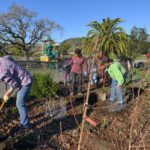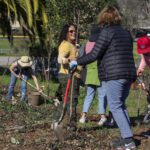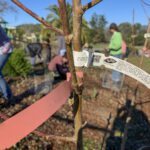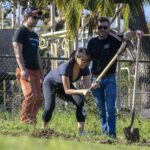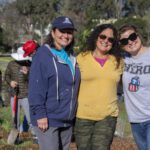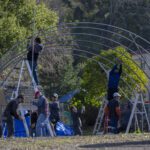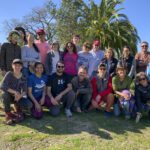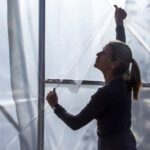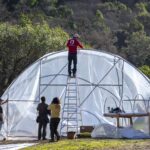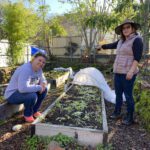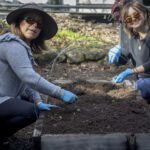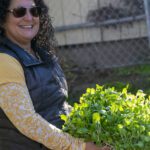A longtime highlight of our Children and Family Services, our Learning Gardens program is growing in exciting ways to increase healthy eating choices and access to fresh fruits and vegetables among the families we serve. We're thrilled to announce an innovative new partnership with local food-system visionary Sanzuma and the expansion of the garden at Old Gallinas Children's Center in San Rafael.
As the operator of Head Start in Marin County and the largest provider of free and affordable childcare for families in Marin, we provide a home-away-from-home for nearly 1,000 children every day. Our services include a nutritious daily breakfast, lunch and snack, prepared and delivered by our own commercial Central Kitchen. Many families rely on these free daily meals as a primary source of nutrition for their children.
We pride ourselves on ensuring that our curriculum includes healthy eating and active living for children and families. Other partners are helping to make our commitment real: Habitat for Humanity and Canal Alliance lent a hand during various construction phases, and community members and our own agency leadership have played an important role in the work to initiate and sustain this vibrant and important project.
There are significant amounts of food insecurity among the families we serve. In Marin County, an estimated one in three children and seniors are food insecure. The local small stores have very limited selection and very little produce. Many of our families default to a daily diet of high-calorie, highly processed, and/or chemically treated foods that compromise their health.
To change these habits and increase nutrition and awareness, children visit the learning gardens daily, participate in growing organic fruits and vegetables, and learn how to care for plants using environmentally friendly farming methods. At lunchtime, meals featuring garden produce are eaten family-style, and teachers lead age-appropriate lessons on where the children’s food comes from and how their food choices can impact their health. To complete the cycle, children will soon learn how the remnants of the fruits and vegetables they grow and eat can be turned into compost, nourishing the soil while reducing garbage waste.
As this project matures, our Central Kitchen will incorporate produce from the Learning Gardens into meals prepared for children at all of our sites. We will also look to construct a chicken coop, outdoor kitchen (for food demonstrations), and offer planting and harvesting events and celebrations.
This year we began taking Sowing Seeds of Success to a new level, expanding one of our gardens into a full-scale production farm through a new partnership with Sanzuma, a local nonprofit adept at reimagining healthy food systems. Founded on the belief that a person's health and diet should not hinge on their economic status, Sanzuma works to increase the availability of freshly grown foods through gardening and urban farming, improving health and reconnecting people with their environment.
With help from our partners, we have begun to dramatically expand the Learning Garden at Old Gallinas Children's Center in San Rafael, which serves a large proportion of low-income and primarily immigrant families. The garden is now a 15,000 square foot production farm, complete with hydroponic tables and a fruit orchard, enabling us to engage more children and families in growing fresh produce on a larger scale, and providing supply exponentially more fresh produce for the meals that the Central Kitchen distributes to all our early childhood classrooms.
Research shows that involving children in a school gardening program may do more than cultivate a green thumb. In one study, elementary school children showed increased willingness to try new foods after growing and cooking in a school-based kitchen and gardening program. Other studies show that, over time, students in schools with farm-to-school programs tend to:
- Eat more fruits and vegetables at school and at home.
- Eat less junk food.
- Drink less soda.
- Be more physically active.
- Know more about healthy eating.
- Become more willing to try new and healthy foods.
- Ask for healthier foods at home.
- Do better in school.
We envision that the production farm at the Old Gallinas Children’s Center will also increase community engagement and create a bigger program footprint in the neighborhood because the garden is a visual reminder of the source of our community's food.
What’s next? We are now openly seeking funders and more partners to help us continue the momentum, to support the Sowing Seeds of Success program, expand our production farm and introduce an annual Family Health Fair that brings families together with healthy food, games, a Farmer’s Market, garden demonstrations and tastings.
To get involved, visit our Volunteer or Donate pages.

